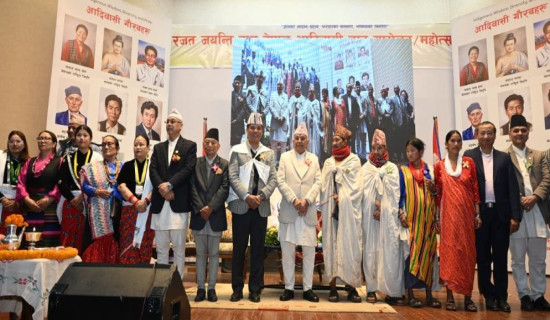- Monday, 9 February 2026
Fishing occupation of Majhi people devastated by flood
Indrawati, July 21: For the past two years, the Majhi people residing in and around the Indrawati River in Sindhupalchowk district, have been facing difficulties in fishing in the river. Traditionally fishing is their occupation, but they have been unable to catch any fish in recent years.
Devastating floods in the river on June 16 and July 17, 2021, left a profound impact on the traditional occupation of the Majhi people. The debris carried by the Melamchi River swept away all aquatic creatures, leaving the Indrawati River with no fish. Prakash Majhi, a resident of Badegaun in Indrawati Rural Municipality-5, said they had no fish in the river.
“Our traditional profession was completely washed away by the flood, leaving us with no means of sustenance. Nowadays, if we venture to the river, it’s a challenge even to catch four or five fish. As a result, all the male members of our society have been compelled to seek alternative jobs, such as labourers, tractor drivers, and masons,” Prakash said.
Frequent floods and landslides that occur every year are also displacing the settlements of several Majhi communities. The flood in June and July 2021 in the Melamchi and Indrawati rivers made their settlement completely displaced.
Indrawati Rural Municipality Ward No. 5, Bandegaun, is an integrated settlement predominantly inhabited by the Majhi community, consisting of 36 households. Within this settlement, the daily routines primarily involve half-aged and married women who mostly spend their time at home taking care of household tasks and family responsibilities.
In this Majhi settlement, the sons of the households play a crucial role as the primary breadwinners. Many of them work as labourers, while some are employed in the fields of local moneylenders. Like in other villages in the country, there is a notable scarcity of young individuals in this community, which may be attributed to migration
to the urban areas in search of better opportunities and livelihoods.
The dynamics of the settlement portray a reliance on the hard work of the sons and the dedication of the women,
contributing to the overall sustenance and prosperity of the Majhi families in Bandegaun.
The 2021 flood wiped away all the houses and farmlands on the river banks. Prakash narrated the devastating aftermath, stating, “Due to the devastating flood, not only did our homes and farms vanish, but even the once-thriving population of fish in the river perished.”
The flood’s destructive force had far-reaching consequences, affecting both the livelihoods of the Majhi community and the river’s aquatic life, leaving behind a landscape of loss and rebuilding, he added.
Parbati Majhi leads her daily life at home within the integrated Majhi settlement. Occasionally, she worries about their food supply, especially if her husband’s earnings are not sufficient.
To contribute to the household income and make ends meet, her husband has taken up a chicken farming venture. They currently have around 10 to 12 chickens, which provide a source of income and sustenance for the family.
Her husband Surya Bahadur Majhi said that by selling these chickens, they can earn a reasonable income. On average, one chicken is sold for around Rs. 2,000 to Rs. 2500.
Over the course of a month, they manage to sell two to four chickens, further supporting their financial situation. This small-scale poultry farming initiative has become an essential means for the Majhi family to secure their livelihood and ensure they have enough to eat.
Thuli Kanchi Majhi, another woman, said after her house located in the lowland area was swept away by the flood, they moved to the new intergraded houses. “Despite these hardships, we manage to maintain a small household, which includes five chickens and two goats,” she said.
In the highly marginalised Majhi community, Sushmita Majhi shares the story of her younger days when she used to go fishing upon friend’s request.
After the devastating flood washed away their settlement, they found themselves living in the middle of the forest. Sushmita reflects that it’s been almost four years since she migrated to the integrated Majhi settlement.
When asked about the gender division in work, she explains that men tend to work outside more because they can work longer hours and receive higher wages. She admits that there is still a slight wage disparity between men and women, with women’s wages often lower.
Sushmita feels that there has been a positive shift towards reducing discrimination in Majhi society compared to the past. “In the time of my mother-in-law, women didn’t have the freedom to make their own decisions. But now, things have changed.
Women take care of household duties, and we also have knowledge and capabilities.”
One concern shared by the community is the lack of relevant documents for the integrated Majhi settlement built on government land. To bring about social, economic, and cultural improvements and changes in the settlement, they call for the attention of relevant authorities and organisations to address their needs.








-square-thumb.jpg)








